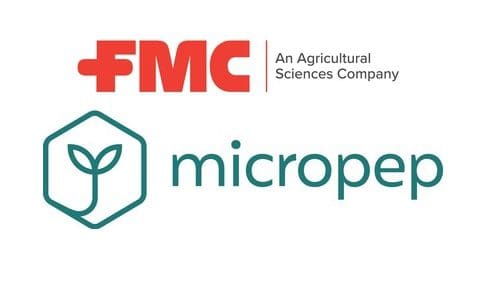
FMC Corporation (NYSE: FMC), a leading global agricultural sciences company, and Micropep Technologies (Micropep), a global leader in micropeptide technology, today announced a strategic collaboration to develop biological solutions to control destructive herbicide-resistant weeds that reduce crop yields.
The collaboration will accelerate the ongoing development of natural weed control products based on short protein molecules naturally produced by plant cells. Under an exclusive multi-year agreement, the partnership will focus on developing new solutions for controlling key herbicide-resistant weeds in corn and soybeans. The companies will combine their respective R&D capabilities leveraging Micropep’s technology to expedite and improve the success rate in identifying innovative biological herbicides.
“We are pleased to collaborate with Micropep in developing novel micropeptide technology to address resistance management,” said Dr. Kathleen Shelton, FMC executive vice president and chief technology officer. “These novel mode-of-action biomolecules in agriculture represent an exciting new frontier; this is a completely new solution compared to what is available to growers today. This agreement demonstrates our continuing commitment to diversify FMC’s world-class R&D pipeline to include a broader portfolio of biologicals that work in combination with synthetics.”
The global herbicide market was over $26 billion in 2021, composed primarily of synthetic herbicides. There are significant market opportunities for bioherbicides that provide effective weed control while also minimizing the impact on the environment. This collaboration advances the development of Micropep’s micropeptide pipeline, which has demonstrated efficacy on resistant weeds and pathogens threatening major crops throughout the world. To address agriculture’s most pressing challenges, FMC is investing in the discovery and development of new modes of action and continues to build an extensive ecosystem of partners to accelerate the speed of crop protection innovation.
“Micropep is building the next generation of natural solutions addressing global challenges in multiple markets, and agriculture is a key focal area. Climate change is already impacting the way farmers produce food, and they urgently need new sustainable solutions to protect their crops,” said Thomas Laurent, Micropep founder and chief executive officer. “This partnership with FMC will expedite the availability of more sustainable solutions. By combining our proprietary AI-powered micropeptide discovery platform and FMC’s strong scientific and commercial capabilities, we seek to develop a selective natural herbicide effective in controlling major resistant weeds.”
Specific terms of the agreement were not disclosed.
About FMC
FMC Corporation is a global agricultural sciences company dedicated to helping growers produce food, feed, fiber and fuel for an expanding world population while adapting to a changing environment. FMC’s innovative crop protection solutions – including biologicals, crop nutrition, digital and precision agriculture – enable growers, crop advisers and turf and pest management professionals to address their toughest challenges economically while protecting the environment. With approximately 6,400 employees at more than 100 sites worldwide, FMC is committed to discovering new herbicide, insecticide and fungicide active ingredients, product formulations and pioneering technologies that are consistently better for the planet. Visit fmc.com to learn more and follow us on LinkedIn® and Twitter®.
About Micropep Technologies
Micropep Technologies, with operations in the US and France, is a global leader in breakthrough micropeptide technology. The company has developed a proprietary AI-powered discovery platform for micropeptides, which are short protein molecules naturally produced by plant cells and have an infinite number of applications. Micropep is building the next generation of natural solutions addressing global challenges in multiple markets, with a key focus in agriculture.




